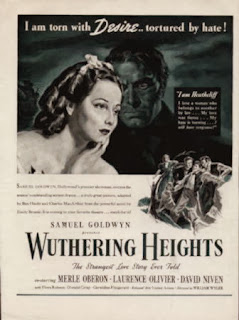Wuthering Heights (1939)
Last summer I read Emily Bronte's novel Wuthering Heights, hoping to see the classic film adaptation, directed by William Wyler. But the DVD was not available until now, and I got the chance to see it.
The film was produced by Samuel Goldwyn, and it was the film he was most proud of. It was a star vehicle for Merle Oberon, but made Laurence Olivier a star. It was released in 1939, who some call the greatest year ever for Hollywood, and won the New York Film Critics Award for Best Picture.
Wuthering Heights covers the first half of the novel. As with the book, it's told as a story. A new tenant stumbles out of a blizzard into the titular Yorkshire estate, finding a depressing group of people. The owner, Heathcliff (Olivier), begrudgingly gives him a room, where the man hears a voice calling in the storm. When he tells Olivier this, the latter runs out into the snow, calling the name Cathy.
The maid, Flora Robson, tells the stranger the story. The estate was once a happy place, seen over by Mr. Earnshaw (Cecil Kellaway). He has adopted a foundling from the streets of Liverpool. He is immediately resented by his son, but the girl, Cathy, becomes his friend. They have adventures, imagining a rocky promontory overlooking the moors a castle. But then Kellaway dies, and the brother (Hugh Williams) allows Olivier to stay, but as a stable boy, where he is routinely beaten and treated cruelly. He stays only because of his love for Oberon.
Eventually Oberon becomes torn between her love for Olivier, who she sees as a kindred spirit, and her love of fine things. She is courted by a neighboring rich guy (David Niven), whom Olivier refers to as a "milksop with buckles." He overhears Catherine say that she could never marry him, because it would be too degrading. He runs off, but returns a rich man, and pays off Williams' debts, thereby owning the estate.
It is here that the film varies widely from the book. The film, as one might imagine, wildly romanticizes the love affair, and makes a big deal out of Olivier visiting Oberon on her death bed. In the book, she dies while he's away. In fact, Catherine dies off-page in the book, which shows Bronte wasn't interested in making a doomed lover story.
But the differences aside, this is a very fine film, with award-winning cinematography by Gregg Toland. Olivier really smolders, and at least he shows us that Heathcliff is not that great a guy. Oberon was only two years removed from an auto accident that scarred her face, yet it doesn't show here. Olivier and Geraldine Fitzgerald, who plays the sister of Niven whom Oliver marries, received Oscar nominations (it was the first of ten for Sir Larry).
The film was produced by Samuel Goldwyn, and it was the film he was most proud of. It was a star vehicle for Merle Oberon, but made Laurence Olivier a star. It was released in 1939, who some call the greatest year ever for Hollywood, and won the New York Film Critics Award for Best Picture.
Wuthering Heights covers the first half of the novel. As with the book, it's told as a story. A new tenant stumbles out of a blizzard into the titular Yorkshire estate, finding a depressing group of people. The owner, Heathcliff (Olivier), begrudgingly gives him a room, where the man hears a voice calling in the storm. When he tells Olivier this, the latter runs out into the snow, calling the name Cathy.
The maid, Flora Robson, tells the stranger the story. The estate was once a happy place, seen over by Mr. Earnshaw (Cecil Kellaway). He has adopted a foundling from the streets of Liverpool. He is immediately resented by his son, but the girl, Cathy, becomes his friend. They have adventures, imagining a rocky promontory overlooking the moors a castle. But then Kellaway dies, and the brother (Hugh Williams) allows Olivier to stay, but as a stable boy, where he is routinely beaten and treated cruelly. He stays only because of his love for Oberon.
Eventually Oberon becomes torn between her love for Olivier, who she sees as a kindred spirit, and her love of fine things. She is courted by a neighboring rich guy (David Niven), whom Olivier refers to as a "milksop with buckles." He overhears Catherine say that she could never marry him, because it would be too degrading. He runs off, but returns a rich man, and pays off Williams' debts, thereby owning the estate.
It is here that the film varies widely from the book. The film, as one might imagine, wildly romanticizes the love affair, and makes a big deal out of Olivier visiting Oberon on her death bed. In the book, she dies while he's away. In fact, Catherine dies off-page in the book, which shows Bronte wasn't interested in making a doomed lover story.
But the differences aside, this is a very fine film, with award-winning cinematography by Gregg Toland. Olivier really smolders, and at least he shows us that Heathcliff is not that great a guy. Oberon was only two years removed from an auto accident that scarred her face, yet it doesn't show here. Olivier and Geraldine Fitzgerald, who plays the sister of Niven whom Oliver marries, received Oscar nominations (it was the first of ten for Sir Larry).



Comments
Post a Comment